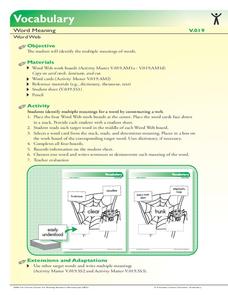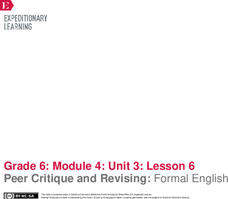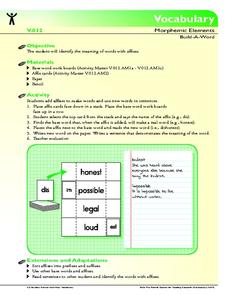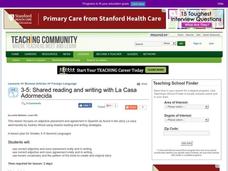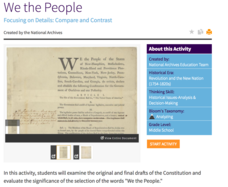Curated OER
Phonics Instruction: Writing Simple Words
Sound it out, read it, then sound it out, and write it. Little ones work as a class to sound out simple words. After they have sounded out each word they will write that word on the white board. This is a great way to build a connection...
Scholastic
Math Word Problems
After reading The Mitten by Jan Brett, youngsters willuse the characters in the story to write word problems for addition and subtraction. For example, they may state that a rabbit had 7 carrots and then lost 2, how many were left? There...
Florida Center for Reading Research
Fluency: Words, Word Climb
Just like climbing a mountain, little learners read to reach the top. They take turns picking high-frequency word cards, reading them, then matching them to the words on their mountain worksheet. They race to reach the top of the...
Florida Center for Reading Research
Phonics: High Frequency Words, Sand Paper Words
Learners use a stack of words embellished with tactile elements, such as sandpaper, to practice high-frequency words. Pupils trace the tactile surface of each letter in the word, write it on their paper, then find and glue that word from...
Curated OER
Reintroduce an Irregular Word
Some words are tricky. Can your scholars quickly recognize irregularly spelled words? Write the word was on the board (or any irregular word you'd like to practice), touching each letter as scholars segment the phonemes. Explain that the...
Florida Center for Reading Research
Vocabulary: Word Meaning, Word Web
Explore the multiple meanings of common homographs with this fun language arts activity. Given a series of word webs and a pile of definition cards, pupils complete each web by matching four different definitions to each target word.
Meadows Center for Preventing Educational Risk, University of Texas at Austin
Lesson 11 - Affixes with Unchanging Base Words
Adding an affix to a word sometimes changes its meaning, just like magic. Using 11th of 17 lessons in the Word Recognition and Fluency series, readers become vocabulary magicians, learning to form and decode words that contain common...
Scholastic
Voyage on the Mayflower for Grades 3-5
Following an online activity, scholars complete a Grafitti Wall in which small groups write words and phrases on chart paper pertaining to Pilgrims, the Mayflower, and Thanksgiving. Pupils perform a close reading then answer a series of...
EngageNY
Peer Critique and Revising: Formal English
Dear Sir or Madam: What's the difference between formal and informal language? Scholars focus on using formal English and transitions in their position papers. After revising their rough drafts, they engage in the peer editing process...
Teach It Primary
What Letter Will You Write?
After reading "The Pied Piper of Hamelin," scholars discuss the emotions the events provoked in its characters. In pairs, writers compose a letter depending on the topic and style of their choice then reply to their own or a peer's...
Florida Center for Reading Research
Vocabulary: Morphemic Elements, Build-A-Word
An affix plus a base word equals what? A new word! Invite your class members to discover words using affixes and base words. Learners then write sentences using the real words that they put together.
Curated OER
Nonfiction Genre Mini-Unit: Persuasive Writing
Should primary graders have their own computers? Should animals be kept in captivity? Young writers learn how to develop and support a claim in this short unit on persuasive writing.
Scholastic
Choose Your Words Wisely (Grades 9-12)
Words, words, words. The function of words in persuasive writing is the focus of a group activity that asks members to analyze how words advertisers use are designed to influence targeted audiences.
Curated OER
Writing Diagnostics and Introduction to Literary Terms
Assess your new learners' writing abilities and knowledge of literary terms with these diagnostic activities. Part of a back-to-school unit, this is meant to provide the teacher with information about the ability levels of their class....
Bright Hub Education
Writing Effective Dialogue
Wait, there is an effective way to practice writing dialogue with your high school class? Great! High schoolers will have a blast writing dialogue using a list of potentially silly situations and an image of people talking. Employ the...
Curated OER
Word Association Poetry with Visual Thesaurus (or Not)
Young poets get inspiration and guidance for making word association poems with the Visual Thesaurus. Your class could complete this project with nothing more than a pencil and paper as well. A nice one-off for a substitute during your...
Curated OER
Shared Reading and Writing with La Casa Adormecida
Write a book using Spanish vocabulary after listening to the book La Casa Adormecida. Learners identify known vocabulary, match vocabulary from the book with visuals, and unscramble syllables discover words. Students write a new version...
Curated OER
Sentences for Sight Word Dictation
Improve your learners' reading and writing skills with a set of sentences designed to help pupils work with sight words. The teacher dictates while the pupils write; this is followed by discussion.
Knox Education
Opinion Argument Writing Packet
You won't need much persuading to use an argumentative writing packet in your language arts class! With helpful reference pages, guided practice through the writing process, examples of opinion and argument writing, and a thorough...
US National Archives
We the People Focusing on Details: Compare and Contrast
Even the most inspiring documents in American history had to go through a few drafts before they were ready for publication. Reinforce the importance of the writing process, as well as the collaborative nature of democracy, with an...
Curated OER
Dolch Word List- By Frequency and Grade Level
Have your learners practice their sight word recognition using this resource. The words, listed by frequency for each grade level, can be placed on flash cards, pinned up on bulletin boards, or otherwise displayed to aid in recognition.
Curated OER
Sense, Sensibility and Sentences: Examining and Writing Memorable Lines
Involve your readers in finding works of literary genius. Have each individual write down compelling sentences that they read or hear, whether in a newspaper, advertisement, book, movie, song, or any other place! Once each person has a...
Scholastic
Writing to a Historical Poet
Poetry is a very personal and introspective art form. Give your class the opportunity to understand how a poet's voice can speak to them on a personal level, and that every reader can respond to an author differently. After a poetic...
Curated OER
Vocabulary Instructional Routine: Multiple Meaning Words in Context
Tackle multiple-meaning words with your youngsters using this scaffolded instructional activity which features a detailed script. Begin with the word shoulder, using context clues to help scholars understand the meaning. Next, they...







